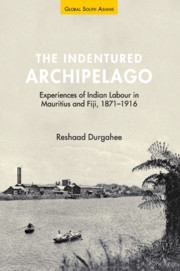Book contents
- Frontmatter
- Dedication
- Contents
- List of Figures and Tables
- Acknowledgements
- List of Abbreviations
- 1 Introduction
- 2 Indentured Spaces: Mauritius
- 3 Indentured Spaces: Fiji
- 4 Subaltern Careering
- 5 Innovation and New Migration Routes
- 6 Conclusion: Space, Agency, Mobility, Geography
- Appendix: Proposed Indian Emigration Routes, 1871–1914
- Glossary
- Bibliography
- Index
3 - Indentured Spaces: Fiji
Published online by Cambridge University Press: 06 August 2021
- Frontmatter
- Dedication
- Contents
- List of Figures and Tables
- Acknowledgements
- List of Abbreviations
- 1 Introduction
- 2 Indentured Spaces: Mauritius
- 3 Indentured Spaces: Fiji
- 4 Subaltern Careering
- 5 Innovation and New Migration Routes
- 6 Conclusion: Space, Agency, Mobility, Geography
- Appendix: Proposed Indian Emigration Routes, 1871–1914
- Glossary
- Bibliography
- Index
Summary
Sugar and the Arrival of Indians
I can, myself, see no reason why the want should not be supplied from the superabundant population of India. The form of government in this colony is one which renders easy the adoption of any legislative measures requisite to secure the good treatment and fair payment of the immigrants. The climate and the country are such as would well suit the health and tastes of Indian coolies; and I do not think they would be found more unwilling to undertake a voyage to Fiji than they originally were to repair to other colonies then equally strange to them. If the Fijian population is ever permitted to sink from its present condition into that of a collection of migratory bands of hired labourers, all hope, not only of the improvement, but the preservation of the race, must inevitably be abandoned. This result would be one, in my opinion, disgraceful to our rule, and it is one which under a different system may easily be avoided. I am therefore anxious to establish here a system of coolie immigration, such as that which exists in the West Indies and Mauritius, and which, I believe, would be attended with mutual benefit to both the Colony and the coolies themselves.
—Arthur Hamilton Gordon, 11 April 1877This chapter explores the lives of Indian indentured labourers in Fiji, as well as time-expired labourers or ‘free’ Indians as they were known in the colony. In this chapter, the term ‘free’ is used when referring to specific citations from archival documents or how these people were referred to by the colonial administration, and ‘time-expired’ is used when discussing this group in my own words. The first ship carrying Indian indentured labourers to Fiji, the Leonidas, arrived in Levuka in 1879 (see Figure 3.1 for a map of Fiji). This was the beginning of Fiji's 37-year Indian indenture era during which over 60,000 labourers arrived in the colony from India. The story of Indian indenture in Fiji is not a straightforward one. Unlike Indian Ocean and Caribbean colonies, Fiji was not a former slave sugar plantation colony. Instead, as small plantations were opened by white Australasian settlers, labour was found through blackbirding, a practice which involved forcibly recruiting (often kidnapping) labourers from neighbouring Pacific islands. Blackbirding was eventually outlawed, with indenture taking its place. In addition to Indian indentured labourers, there were also Fijian and Polynesian indentured labourers.
- Type
- Chapter
- Information
- The Indentured ArchipelagoExperiences of Indian Labour in Mauritius and Fiji, 1871–1916, pp. 98 - 164Publisher: Cambridge University PressPrint publication year: 2021



